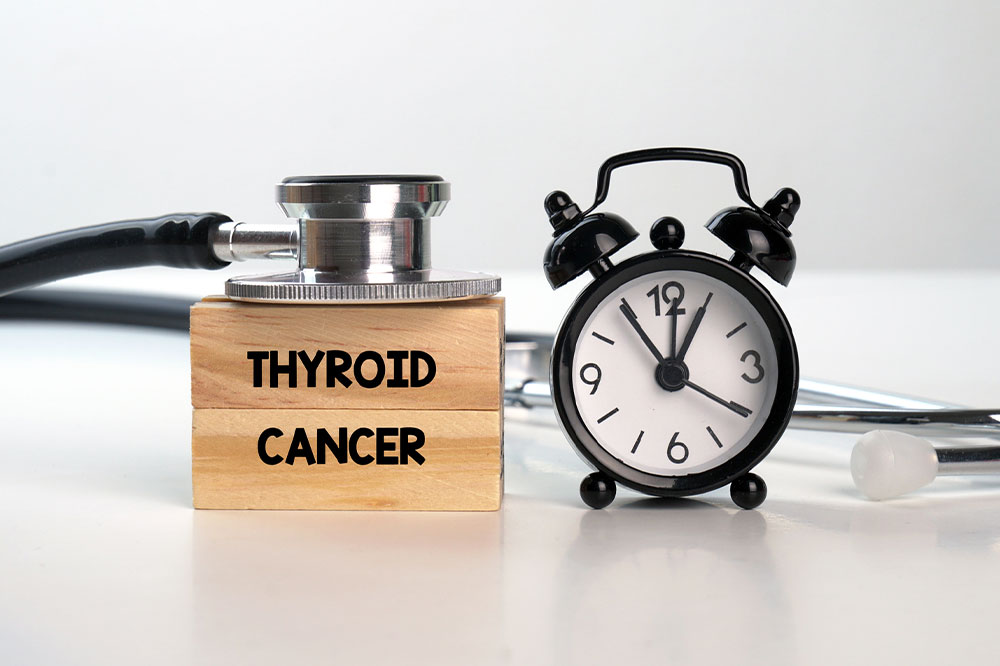Thyroid cancer – Causes, Symptoms, and management

The thyroid gland is one of the most crucial organs in the human body and is responsible for producing hormones. These hormones control vital functions like blood pressure, heart rate, and core body temperature. It is located in the lower region of the neck. Any abnormal cell growth in this region causes thyroid cancer, more cases of which are reported among women. The known causes, risk factors, and symptoms of thyroid cancer are listed below.
Causes and risk factors
Family history of cancer
Having a close family member who was previously diagnosed with thyroid cancer significantly increases the risk. It is for first-degree relatives, including parents, brothers, sisters, or children.
Genetic risk
Inheriting faulty genes also increases the risk of certain types of cancer. A modified genetic code can trigger health complications linked to the thyroid gland. Genetic risk is a common trigger factor in 25% of the cases diagnosed with medullary thyroid cancer.
Exposure to radiation
The thyroid gland is susceptible to radiation. Therefore, repeated exposure does increase the risk of cancer among men and women. Commonly, the first signs of radiation exposure include developing nodules and lumps around the thyroid gland.
Iodine deficiency
Iodine is an essential nutrient for the thyroid gland to function normally. An iodine deficiency has been cited as one of the known risk factors for cancer. Low levels, coupled with radiation exposure, increase the chances of being diagnosed with thyroid cancer.
Benign thyroid diseases
An enlarged thyroid gland, Hashimoto’s disease (an autoimmune condition), and adenomas are all complications that also increase the risk of thyroid cancer. While these conditions are non-cancerous in most instances, over 5% of the affected people progress into the cancer stage.
Age
The risk of cancer is high among women between the ages of 44 and 49. Men are at risk at an older age, between 80 and 84.
High body mass index
A higher-than-usual body mass index (BMI) affects metabolic activities controlled by the hormones produced by the thyroid gland. It happens because excessive body mass increases the production of hormones that control vital functions governing growth and libido.
Other autoimmune conditions
An autoimmune response happens when the body’s immune system attacks its healthy cells. Underlying autoimmune health complications like systemic lupus erythematosus double the risk of thyroid cancer.
Warning signs and symptoms
There are visible and underlying signs of thyroid cancer to keep in mind for a timely diagnosis.
New lumps or nodules
The thyroid gland is butterfly-shaped and sits just above the voice box in the neck. A new swelling, lump, or bumpy nodule may begin to form on one side of the gland, indicating cancer. This lump can be felt through the skin with the slightest touch. Therefore, it is advisable to get such abrupt growths checked by a specialist for prompt diagnosis and treatment.
A feeling of tightness
The thyroid gland wraps around the throat and voice box. Experiencing persistent tightness in this region indicates an issue with the gland. This sensation of tightness is quite similar to the feeling experienced while wearing a tight-collared shirt.
Changes to the voice
As the gland wraps around part of the voice box, changes in its original shape can affect the voice quality and output. Sudden hoarseness with no underlying health condition to explain these changes indicates thyroid cancer.
Difficulty breathing and swallowing
It is a common symptom observed for many overlapping conditions. However, constricted breathing could indicate an overgrowth of cells in the gland and the general neck region, indicative of cancer. This cell mutation can quickly metastasize, spreading to the lymph nodes if left unchecked.
Swollen lymph nodes
Lymph nodes are part of the immune system that act as transport channels for lymphocytes (known as white blood cells) to protect the body from disease and infections. A swollen lymph node in the neck indicates cancer progression in the advanced stages.
Persistent coughing
If a cough develops and lingers without any underlying condition like the common cold or a viral infection, it could be a progressive indicator of thyroid cancer. Spitting blood with the cough is also a disturbing warning sign and necessitates an immediate checkup by a healthcare expert.
Neck pain
Any pain that starts at the front of the neck near and around the thyroid gland, spreading to the sides of the ears, also indicates the early stages of thyroid cancer. These are rare but notable symptoms that shouldn’t go unchecked.
Diagnosis
Doctors will perform a physical exam to inspect the thyroid gland thoroughly. Further blood tests, a biopsy, and ultrasound imaging will be carried out depending on the results. Blood tests will confirm the overall health of the thyroid gland based on the amount of hormones produced. Ultrasound imaging is done to check the thyroid nodules and confirm the presence of cancerous cells. A fine-needle aspiration biopsy will help narrow down the type of thyroid cancer. In addition, a radioactive tracer (mostly iodine) highlights the areas where cancer might have spread. Doctors may also recommend frequent Computed Tomography (CT) scans and Magnetic Resource Imaging (MRI) scans to track the progression of cancer in its advanced stages.
Treatment and outlook
Treatment options for thyroid cancer vary depending on the severity of the condition. These include a combination of hormone replacement therapies and surgeries to tackle the different stages of cancer. For some types, radioactive iodine treatment targets the cancerous cells directly. Advanced stages of thyroid cancer will require partial or complete removal of the thyroid gland, targeted therapy, radiation therapy, or chemotherapy. Even heat and cold can be used as radiofrequency ablation or cryoablation to neutralize cancer cells. However, it is necessary to note that the prognosis and outlook for recovery depend solely on the treatment and results.


